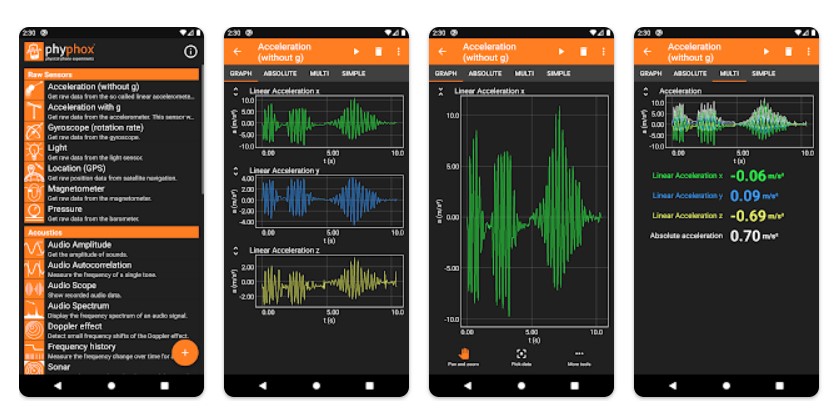From an engineering perspective, it’s really amazing how many sensors are built into modern phones: 3 axis gyroscopes, accelerometers, air pressure sensors, etc. Most are used for rather mundane tasks at best (like switching from vertical to horizontal orientation when rotating the phone).
phyphox is an app that uses these sensors for science experiments. Some are specific (finding the speed of an elevator) while others are raw logs of data from the sensors. While the data may be too rough for professional grade research, it would be perfectly useful in teaching science.
Many of the tools the app offers are available in more traditional lab equipment, but part of the issue is the cost. For example, the school I worked at used equipment by the company Vernier; a barometer to measure air pressure alone costs $126 USD. This ignores the interface equipment and software needed to make it useful. Meanwhile, nearly every student had their own phone with a barometer already built in.
As much as I like the features of phyphox, I admit to using it rarely. Mostly this was due to practical reasons: getting the app installed, transferring data, etc. was problematic on our restricted school network. Also, we already had the equipment available so it was convenient to just grab it from the lab. Finally, there is only so much risk I’m willing to take with personal devices (mine or students’).
My school, like many others, viewed phones as more distracting than beneficial, so discouraged their use unless approved. And while I understand the perspective, it seems like we’re missing opportunities with apps like phyphox.

Hi Rich,
Yes, I think understanding first principles is very important. In teaching physics, a lot of the early material is really showing how even ordinary situations can combine multiple factors, and the genius of physicists like Isaac Newton was in being able to parse out the individual elements. Then build things back into more complex ideas, but always starting from first principles.
When it comes to lab equipment, depends a lot on the context and objective. I tend to teach higher grades so I tend to assume that some of the basic ideas have been covered, so going into historical methods depends on what we’re doing. If we’re talking about circular motion, the basic ideas of acceleration are required prior knowledge so I’d be ok using a “black box” device to measure acceleration. However, when talking about Newton’s laws of motion, I would make that more explicit. One time I attached a mass to a force meter then had my (very small) class ride along with it in the school elevator, so show that it effectively became an acceleration measurement.
One of the harder concepts I find for students has been working with experimental uncertainty, and modern digital equipment can be a barrier with this specific idea because it is too clean and precise. So we might do some experiments with very clunky equipment to introduce those concepts, then extrapolate to more subtle versions with higher quality instruments.
Bottom line with this or any other technology in my opinion: start with teaching objectives, then choose the right tools to deliver that. I love high tech toys, but it’s definitely easy to get seduced by the cool factor and miss the point.
Devon
Hi Devon,
This is really interesting!
Do you think there is merit or that it is important for learners to comprehend the fundamentals of how older technology works before they jump to newer technology?
I don’t know if I am wording that clearly, but for example, in the case of understanding barometric pressure, it is important for students to first grasp the concepts of how it was measured using the first barometers and then on the ones you mentioned that your school lab has that specifically measure that function and then finally to introduce them to the end fact that their phone can do it all and produce all this data?
I guess as an engineer and science teacher you want your students to understand first principals, but as technology moves so quickly, is that a) important? and b) hard to keep up with?
Thanks.